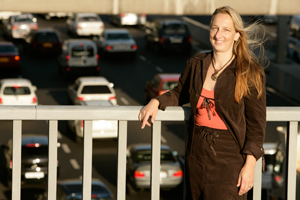Network tackles African transport and environment issues
29 March 2010 The wheels are turning: Assoc Prof Marianne Vanderschuren is leading the South African component of an international network that will be looking into Africa's ongoing transport concerns.
The wheels are turning: Assoc Prof Marianne Vanderschuren is leading the South African component of an international network that will be looking into Africa's ongoing transport concerns.
Researchers at the University of Cape Town are part of an international effort to tackle problems such as traffic congestion, air pollution and road safety in Africa.
Leading South Africa's contribution in the Transport and Environment-Science Technology (TEST) Network, Associate Professor Marianne Vanderschuren of UCT's Centre of Transport Studies is co-ordinating a national drive to strengthen scientific and technological support for the implementation of sustainable transport policies in the country.
"Road safety, traffic congestion, urban air pollution, road maintenance, accessibility and mobility problems are key challenges in South Africa," says Vanderschuren. "Transport policies that deliver sustainable cities, healthy citizens, development and poverty eradication are urgently needed."
The TEST Network is led by the Stockholm Environment Institute at the University of York in the UK, and the European branch of the Institute for Transportation and Development Policy, based in Germany. The network involves universities from six African countries, UN-Habitat, and the International Forum for Rural Transport and Development (IFRTD). It is funded by the EC African, Caribbean and Pacific Group of States (ACP) Science and Technology Programme.
Other African partners include Universidade Eduardo Mondlane in Mozambique, Ardhi University of Tanzania, Makerere University in Uganda, the University of Zimbabwe and the University of Zambia.
The three-year capacity-building project will strengthen networking, share knowledge, and enhance research capacity on transport and environment science and technological issues.
"We aim to mount a determined effort to improve air quality, reduce death and injury on the roads, reduce greenhouse gases and widen opportunity and accessibility for all, but especially those on very low incomes," adds Vanderschuren.
At its inaugural meeting at UCT earlier this year, participants agreed on a programme of activities for the network, including an assessment of research capacity, benchmarking good transport practice and communicating the science to key stakeholders.
The programme of activities will culminate in a United Nations Regional Policy Dialogue on Transport and Environment Science and Technology at the United Nations Environment Programme headquarters in Nairobi in 2012.
For further information about the TEST Network and the South African activities within it, contact Vanderschuren at telephone 021 650 2593 or email Marianne Vanderschuren.
 This work is licensed under a Creative Commons Attribution-NoDerivatives 4.0 International License.
This work is licensed under a Creative Commons Attribution-NoDerivatives 4.0 International License.
Please view the republishing articles page for more information.









